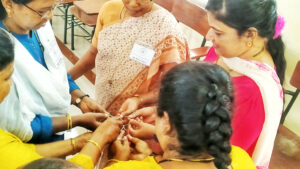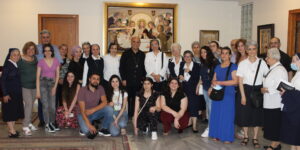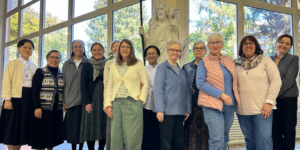Sister Joan Marie Lopez was born in Seremban, Malaysia. She entered the Province of Singapore-Malaysia, making her first profession in Singapore in 1992 and her perpetual profession in Seremban in 1997. She will shortly begin her mandate as the 13th Congregational Leader. Below, she shares with us something of her journey.
Picture one: Sister Joan in 2004 while on mission in Sabah, Malaysia.
Can you share something about your experience as a member of the international Committee of Life Seekers and what learning you bring from it into your new role as Congregational Leader?
Being a member of this committee – charged with exploring new ways to move the Congregation into the future – was so transformative for me. As we worked through the input and responses from our sisters and partners in mission, we realized how the same issue could be seen from a variety of perspectives. We discovered the differences that exist between the various units and the distinct stages at which sisters find themselves – each with unique experiences of structures and leadership. It became clear that implementing a standard structure would not work for everyone. Any way forward would need to be appropriate to the specific context and unfolded slowly to help bring everybody to be almost on the same page.
In time, I realized that the committee itself was a microcosm of the Congregation. For example, we may have thought that something had been universally understood and agreed upon. Then someone would suddenly disagree and ask, “why are we doing it that way?”. We understood that this is how it will be on a congregational level. When we think we are on the road to somewhere, we may be called to stop and re-question our path. This pause is healthy and may even call us to backtrack a little to see things differently and perhaps even take a turn that was bypassed earlier. I feel that much of what I learned as part of this committee will influence how I work as Congregational Leader.
And what will you carry with you from your previous province ministries into your new role?
I have been blessed in my ministries, which have included kindergarten teaching, grassroots social services, board-level work, committee work, leadership responsibilities at community, provincial and regional levels, and involvement in initial and on-going formation across all levels.
Picture two: The members of the Asia-Pacific Integration Team sharing a meal in Singapore, 2017.
I have been greatly influenced by the ministries I’ve been involved with in my home country of Malaysia. It is a country with a rich social fabric of multiple races, religions, ethnicities, cultures, and languages, which is further enhanced by the large migrant communities that come from across Southeast Asia and beyond. Through my ministry involvement at grassroots and national levels, I have been privileged to work and serve alongside a diverse range of partners in mission and program participants.
The cultural diversity of the girls, women, and children we serve has heightened my awareness of cultural and religious sensitives and of how to make allowance for these. These opportunities have also allowed me to learn more about the realities of the context of where they come from and listen to the lived experience of their journey.
Of course, leading a global Congregation with a presence in 72 countries will represent working and serving alongside a greater diversity of people and will be challenging. Still, I feel that my experiences have given me a window of insight into the ministries we provide and the girls, women, and children we will continue to serve through our programs.
You had the opportunity to live and work alongside Sr. Susan Marie Chia in your province. How do you feel her vision and spirit continue to live on within the Congregation?
You know, I speak with Susan every morning. She was a true visionary. She always felt that our beautiful mission of reconciliation and reaching out in mercy and compassion to those we serve can only be achieved by working together with others far beyond the limits of those in religious life. Her holistic vision of mission allowed her to see the possibilities that lay within each person, irrespective of who they were. She rightly saw our mission as being carried out in partnership, based on best practice and adopting an integrated justice and rights-based approach.
I don’t believe Susan’s vision or spirit has died – or can die – because she went about sharing her vision through formation and training. She knew that the future lay in the hands of the younger sisters and partners in mission who would be the leaders and formators of tomorrow.
She understood how the training she provided would ripple through those who attended her training; they would then go on to train others. So even though she passed away in 2015, I believe that her vision and spirit are present to some degree in many formators throughout the Congregation and in those they have formed. And her vision and spirit will live on as that small ripple continues to permeate throughout the Congregation and beyond.
I would like to share with you an experience of how Susan’s actions reflected those of St. John Eudes in his response to the plea from Madeleine Lamy. I was in the province leadership team with Susan when she received a call in 2009 from one of our partners in mission in Malaysia pleading to her to respond to the urgent needs of a group of trafficked women. “How can you call yourself Good Shepherd,” the volunteer cried, “if you don’t open your doors to these trafficked women?”
We were stunned and disturbed by the challenge. Susan was a person open to being challenged by anybody, and even though we felt ill-equipped, we felt moved to act with urgency. We called up our sisters and partners working with us and said, “let’s open our doors to these women.” And from that moment onwards, we have been working on anti-trafficking projects.
Her vision still pushes us onwards today. I believe that many of us have a trace of her within us. If we have somehow been inspired by her, then we have captured something of her essence.
Picture three: Sister Susan Chia beside Sister Joan (center back) while on mission in a remote area of Sabah, Malaysia.
On a personal level, how would you say that you have been inspired by Susan?
Susan encouraged me to think outside the box and dare to carry out mission in new and creative ways. For example, after we opened our doors to trafficked women, it remained a challenge to think about how we could make known this vital work – to secure funding – while not explicitly advertising or promoting the projects. Then, one day in 2016, while attending a workshop on anti-trafficking given by Sister Clare Nolan, I saw the flicker of a play appear in front of my eyes. A vision of inspiration that eventually evolved into Euphrasia, the Musical.
It took two years to write and produce and was eventually staged for 10 live performances, reaching over 5000 people. This was in addition to all those involved in its production and the thousands who have since paid to watch it online.
The musical has opened the eyes of many people who were simply unaware that trafficking was such a huge problem or that we as a Congregation provided ministries to respond to the needs of women who are exploited and marginalized.
Many people who watched it were inspired to become donors, some referred women to us who had been trafficked or were in crises, and some have even become actively involved in the mission.
How do you see the evolving role of our partners in mission in delivering our shared mission?
In the 1990s, the Province of Singapore-Malaysia arrived at the point that our capacity to effectively carry out the ministries was diminishing as our sisters grew older and decreased in number. This coincided with an increasing number of policy changes and requirements imposed by the State that we had to comply with in our ministries.
It was a big challenge for us to accept that our numbers, skills, and abilities were increasingly insufficient to respond to growing demands. However, we gradually acknowledged that if we wanted to stay relevant, if we wished our mission and ministries to become more effective, that we couldn’t continue to do things the way we had in the past. We had to change; we had to adapt; we had to improve; we had to upgrade. We also realized that while we needed time to make these improvements and upgrades, the mission and ministries had to continue.
We understood the solution lay in securing employees and volunteers with the appropriate skills, abilities, and qualifications to assume key leadership roles. However, this demanded a change of mindset. A shift to be open and to trust.
Gradually, once we opened up and trusted our partners in mission to come on board, we realized – through a process of discovery and evolution – that they too were passionate about mission and ministry, and that they were coming with values of compassion, mercy, reconciliation, integrity, respect, gratitude, zeal – values that we upheld and believed in. They had the charism within them too.
Picture four: Mission partners from across Singapore and Malaysia gathered in 2018 to participate in Formation Sessions.
Our eyes were opened to the fact that the mission and charism are gifts given by God to people and are much more widely spread than just those of us in religious life. Initially, I, like many, struggled with a shift in my own mindset – in thinking in a new way. But I learned to see and appreciate that we are all mission partners. And I carry this as my vision for the future: that we are all equals – whether contemplative or apostolic, former Our Lady of Charity or not, whether sister or partner in mission – all mutually collaborating in the mission for the love of those to whom we are called to serve.
Picture five: A gathering of sisters and partners in mission in Singapore.
Additional possible photo:
Picture six: Sister Joan with her extended family at an event in 2017.






